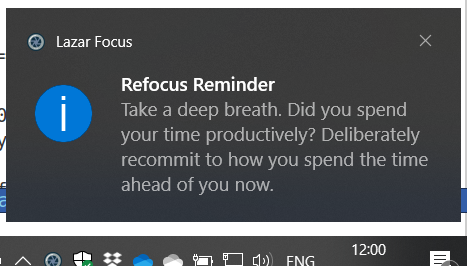Peter Bregman’s 18-minute plan for managing your day and the surprising power of refocus reminders
In 2009, Peter Bregman published a short but fantastically valuable time management article on the Harvard Business Review called An 18-Minute Plan for Managing Your Day.
This article contains a number of the most important tricks to ensure that your day is as effective and valuable as it could possibly be.
Let me summarise:
Select the right tasks to do and then schedule them
At the very start of your work day, preferably before opening email, take 5 minutes to think about and then write down the things you need to do to make the day highly successful.
Now schedule hard blocks of time in your agenda for each of these tasks, placing the most difficult and most important tasks at the start.
Many people know about the value of taking this time to formulate the right tasks to take care of, but not that many recognize the value of scheduling these right into your calendar, along with all of the other less important appointments that usually manage to squeeze out the tasks that are actually important.
For 1 minute every hour, REFOCUS
Bregman suggests setting some sort of alarm to ring every hour.
When that alarm rings:
… take a deep breath, look at your list and ask yourself if you spent your last hour productively. Then look at your calendar and deliberately recommit to how you are going to use the next hour. Manage your day hour by hour. Don’t let the hours manage you.
To me this advice was the biggest surprise, but after having tried it for a while, I am a convert.
Having some reliable mechanism reminding you every hour to take a step back, evaluate the past hour, and gather your energies to take on the next hour with renewed energy and focus, is an unexpectedly effective trick that has substantially boosted the effectivity of my working hours.
I found this such a useful trick for maintaining focus that I implemented it as an optional feature in the Lazar Focus tool. You can configure it to remind you every hour, or every 15 or 30 minutes, and you can also activate a meditation bell sound, something that I find brings me back even more quickly to my focus.
The notification looks as follows:

The Lazar Focus Refocus Reminder notification. Meditation bell sound not shown. :)
Review
The third and final step in Bregman’s plan is to take five minutes at the end of the day to review how it went:
What worked? Where did you focus? Where did you get distracted? What did you learn that will help you be more productive tomorrow?
Any good time management approach should involve one or more forms of review. This helps us to learn, and also generally to keep the whole process ticking along smoothly.
Conclusion
To reiterate: Bregman’s post is one of the most compact yet valuable pieces of writing on effective time management.
I hope that you find as much value from the 18-minute plan as I do, and that perhaps Lazar Focus could play a small role in this.
Be deliberate, get things done!
Block distractions with Lazar Focus so that you can focus on what's important.
- You can get Lazar Focus from the Microsoft Store for $25. After the first hour or two of working with Lazar Focus, you will start seeing the continuous return on investment.
- Follow LazarFocused on Mastodon or @LazarFocused on Twitter to stay up to date with future developments and special offers.
- Read more about Lazar Focus on the Help and the Features pages.
